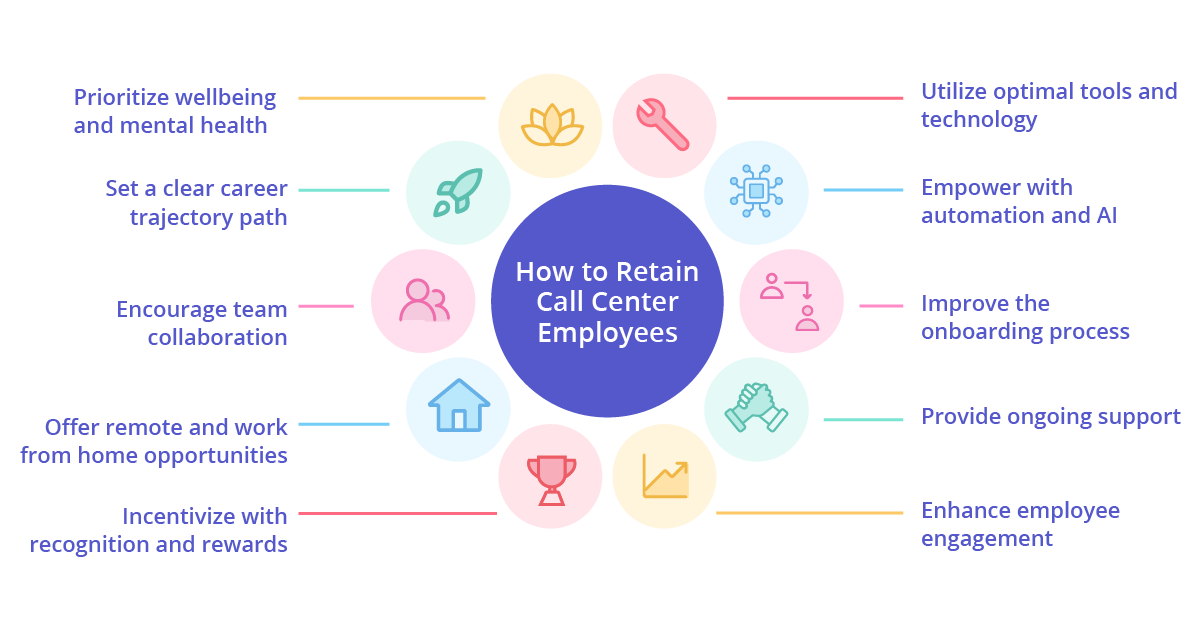10 Ways to Improve Call Center Employee Retention

Employee retention in a call center refers to the organization's capacity to retain its workforce and minimize attrition. With notoriously high turnover rates in the customer service industry, improving employee retention stands as a top priority for any call center.
The employee retention rate is the percentage of employees who remain employed throughout a specific timeframe. It can be calculated as the opposite of attrition rate. Given that current attrition rates have been reaching as high as 65-80%, retention rates for call center employees are often only 20-35%.
Since employees who are satisfied with their work are 2.5 times more likely to remain within the organization, it is undeniable that employee satisfaction drives retention. Therefore, enhancing the employee experience becomes imperative to improve call center employee retention.
Why call center employee retention is important
Growing employee retention is critical in the current call center landscape where attrition rates are high and finding new talent is difficult. More importantly, the retention of valuable employee experience and knowledge remains crucial for business success.
These are some of the immediate benefits of improving call center employee retention:
Save costs associated with recruitment and onboarding
With the current cost of replacing an agent at $10,000 to $20,000, it is crucial to retain top-performing agents for as long as possible.
Increase operational efficiency
Constantly onboarding new hires not only incurs significant costs but also results in decreased productivity levels. During the initial ramp-up phase, agents lack the ability to handle live calls autonomously, leading to errors that can prove detrimental to the performance of the call center.
Customers are satisfied when their needs are met
A substantial 94% of customers say that positive service experiences heighten their inclination to make repeat purchases. Unfortunately, when agents are left grappling with the responsibilities of departed colleagues, it contributes to extended queue wait times, increased hold times, and a reduction in first call resolution (FCR).
Engaged employees boost company reputation
Almost all customers state that excellent customer service fosters trust. Since engaged agents are more likely to stay in their role, they are also more inclined to go the extra mile to assist customers and deliver exceptional customer experiences.
![]()
Strategies to retain employees in a call center
Utilize optimal tools and technology
Fragmented systems and complex processes force agents to waste valuable time, detracting from their capacity to effectively assist customers. Without access to up-to-date, efficient technology, retaining employees proves challenging as it often leads to increased levels of frustration.
A user-friendly, cloud-based knowledge management system empowers agents to instantly identify the exact steps they need to take during customer interactions. This easy information retrieval eliminates information gaps and helps guide agents through difficult customer scenarios, instilling a sense of confidence as they are able to deliver an elevated quality of service.
Empower with automation and AI
Repetitive tasks disrupt workflow and cause agents to exert too much effort on low-value work. This can lead to stress and burnout, ultimately hindering employee retention.
Implementation of automation for these routine processes reduces agent effort, enabling agents to dedicate their attention solely to customer interactions. For example, using an AI-powered conversation guidance tool such as Agent Assist helps agents quickly retrieve information from crowded knowledge bases by analyzing customer inquiries, finding contextually relevant information, and offering suggestions in real-time.
Fragmented systems and disconnected technology can significantly hinder job satisfaction. The integration of agent systems into a unified agent desktop eliminates the need for multitasking and constant tab-switching. This empowers agents to effectively assist customers and seamlessly resolve inquiries.
Improve the onboarding process
The onboarding process typically consists of the training program, post-training ramp to proficiency, and the achievement of full proficiency. It is crucial for agents to reach proficiency as soon as possible to cultivate motivation and confidence in their roles. Otherwise, agents will feel incapable of effectively assisting customers, leading to disengagement and subsequent attrition.
To engage new hires, incorporate customized learning opportunities and actively involve them in the learning process. Immersing agents in real-world scenarios helps prepare them for the challenges of the role, allowing them to transition to production with confidence.
Provide ongoing support
Employees should be supported throughout the entirety of their tenure within the organization through regular training and coaching sessions.
Establish two-way feedback communication by attentively addressing agents' concerns and using their input to demonstrate the value of their contributions to the organization. This approach not only improves employee retention by fostering agent motivation and commitment but also elevates the company’s reputation by instilling a sense of appreciation and respect among agents.
Enhance employee engagement
Employee engagement plays a pivotal role in the success of any business. Engaged employees are more likely to have a favorable outlook on the company and refer their friends. Their enthusiasm also tends to inspire colleagues to excel in their performance.
To promote employee engagement, maintain frequent and consistent communication. Keep employees informed about company updates and ensure that the organization’s goals are aligned with their own.
Demonstrate a genuine investment in employee development by fostering a culture of continuous learning and improvement. And empower them by providing the necessary resources and encouragement to excel in their positions.
Incentivize with recognition and rewards
A great way to retain employees is by recognizing and rewarding their individual and team achievements. By including a diverse range of rewards, encompassing both financial and non-financial incentives, employees will feel valued and appreciated for their hard work.
Potential financial rewards might involve a team lunch or yearly bonus, whereas non-financial rewards could encompass options like preferred shift scheduling or companywide celebrations.
These incentives not only increase motivation but also build trust and lead to increased employee dedication to the organization.
Offer remote and work from home opportunities
A growing number of employees now prefer to work remotely, with many indicating that they would consider leaving an organization that lacks this flexibility. To guarantee retention, employees should be granted the autonomy to choose their working environment.
Ensure that remote agents receive an equal amount of support to those working in-office. Agent tools should be optimized for remote work, with cloud-based technology being essential for real-time communication among employees, regardless of their location.
Encourage team collaboration
Employees who feel connected to their team are more likely to stay within the organization.
Regular meetings should be scheduled to encourage team members to share their ideas and cultivate a team spirit. Implementing team-building strategies and engaging in activities such as charity events or offsite games provides colleagues with opportunities to establish connections and collaborate around common interests.
Internal social networking tools are highly effective for fostering communication and creating a sense of community among team members. Especially valuable for remote workers, these tools offer a platform to showcase company updates, social events, and employee achievements for everyone to collectively celebrate.
Set a clear career trajectory path
Considering that more than half of agents view their positions as career paths, it becomes apparent that employee retention hinges on providing opportunities for internal mobility. Otherwise, employees may find themselves seeking alternative options elsewhere.
Call center managers should be actively involved in the development of their employees, offering a clear view of the future they hold within the organization. They should familiarize themselves with agents’ goals, establish a career development plan, and actively promote from within.
Upskilling agents and expanding their role specialization not only encourages internal growth but also improves customer experiences as agents gain advanced knowledge relevant to their roles.
Create a positive company culture
With high call volumes and challenging customers, the role of a call center employee is inherently stressful. This emphasizes the importance of providing employees with wellbeing tools and resources to promote mental health and mitigate burnout.
Some examples of wellbeing offerings include corporate wellness applications, mental health time off, on-site fitness facilities, and educational workshops.
By showing employees that their wellbeing is important to the organization, it encourages employees to remain committed to their roles. 
Improve employee retention to guarantee call center success
Organizations that place employee retention at the forefront gain a competitive advantage by cultivating a motivated and engaged workforce eager to contribute to business growth. This leads to an increase in service quality, amplifying brand trust and customer loyalty.
Moreover, the potential for considerable cost savings associated with recruiting new employees emphasizes the benefits of retaining high-performing employees for call centers.


